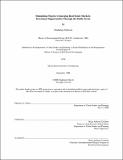| dc.contributor.advisor | Brian Anthony Ciochetti. | en_US |
| dc.contributor.author | Odusote, Oladimeji | en_US |
| dc.contributor.other | Massachusetts Institute of Technology. Center for Real Estate. | en_US |
| dc.date.accessioned | 2010-09-22T16:01:52Z | |
| dc.date.available | 2010-09-22T16:01:52Z | |
| dc.date.copyright | 2008 | en_US |
| dc.date.issued | 2008 | en_US |
| dc.identifier.uri | http://hdl.handle.net/1721.1/58651 | |
| dc.description | Thesis (S.M. in Real Estate Development)--Massachusetts Institute of Technology, Dept. of Urban Studies and Planning, Center for Real Estate, 2008. | en_US |
| dc.description | This electronic version was submitted by the student author. The certified thesis is available in the Institute Archives and Special Collections. | en_US |
| dc.description | Includes bibliographical references (leaves 68-69). | en_US |
| dc.description.abstract | In its Global Economics Paper Nc.134, the Goldman Sachs Economics Group highlights the West African country of Nigeria as having the potential to be among the next generation of emerging markets around the world the next eleven (N-11) - after their much publicized BRIC countries: Brazil, Russia, India and China. Nigeria - the only country included from Sub-Saharan Africa - is shown to have the potential to become one of the top 20 economies of the world by 2025: owing to such indicators as recent GDP growth - and projections for continued growth - and its substantial population. As is typical with emerging markets, rapid growth in Nigeria's economy translates into an equally rapid growth in the demand for institutional quality real estate and the first signs of this can already be observed in the country's major markets of Lagos, Port-Harcourt and Abuja. This growirg demand has however been met with very limited supply, resulting in high and growing rents in these markets and an opportunity for profitable real estate investment, where they can be found. This paper examines the role of the public sector as one such source of real estate investment opportunity: The public sector having hitherto played a very active role in the country's real estate development. An analysis will be made of the historical development of public sector inflence on real estate; and then an evaluation made, on the opportunities being created, as this influence is directed towards encouraging private sector investment and expertise. | en_US |
| dc.description.statementofresponsibility | by Oladimeji Odusote. | en_US |
| dc.format.extent | 72 leaves | en_US |
| dc.language.iso | eng | en_US |
| dc.publisher | Massachusetts Institute of Technology | en_US |
| dc.rights | M.I.T. theses are protected by
copyright. They may be viewed from this source for any purpose, but
reproduction or distribution in any format is prohibited without written
permission. See provided URL for inquiries about permission. | en_US |
| dc.rights.uri | http://dspace.mit.edu/handle/1721.1/7582 | en_US |
| dc.subject | Urban Studies and Planning. | en_US |
| dc.subject | Center for Real Estate. | en_US |
| dc.title | Stimulating Nigeria's emerging real estate markets : investment opportunities through the public sector | en_US |
| dc.type | Thesis | en_US |
| dc.description.degree | S.M.in Real Estate Development | en_US |
| dc.contributor.department | Massachusetts Institute of Technology. Center for Real Estate | en_US |
| dc.contributor.department | Massachusetts Institute of Technology. Department of Urban Studies and Planning | |
| dc.identifier.oclc | 316064780 | en_US |
